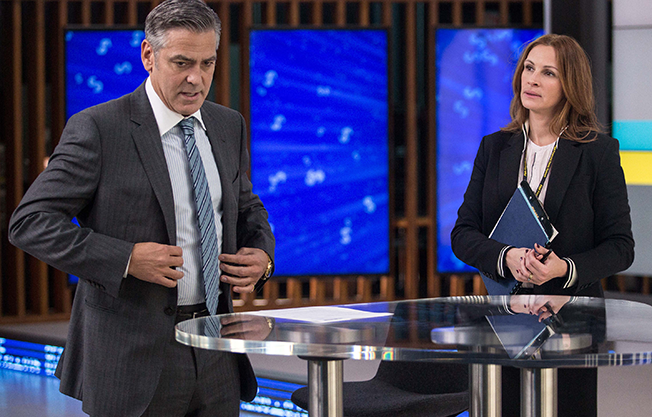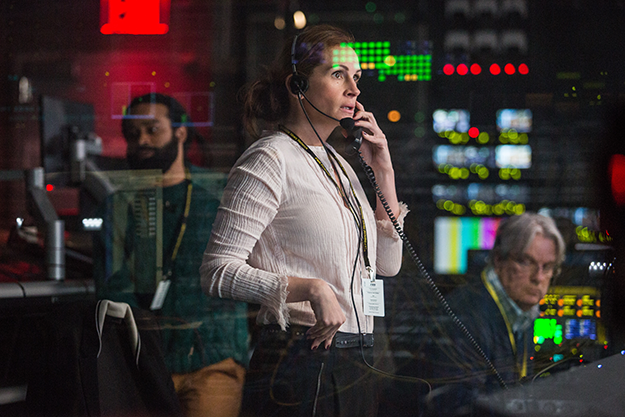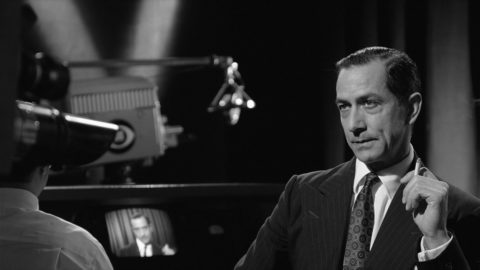Deep Focus: Money Monster
On my way to the screening of Money Monster, I got stuck behind a gleaming white BMW with vanity plates reading “RVLTION.” I couldn’t help thinking of that car and those plates during this limousine-liberal melodrama about a deliveryman (Jack O’Connell) who holds a cable financial news clown (George Clooney) hostage for recommending a trading fund called Ibis.
Yes, that’s Ibis. Rhymes with Isis.
Loaded gun in hand, the working-class antihero, Kyle Budwell, sneaks onto a finance show’s live set in New York, forces Lee Gates, the buffoonish star, to don an explosive vest, and demands that Gates and his scheduled guest, Ibis CEO Walt Camby (Dominic West), explain how $800 million of stockholders’ investments could have gone up in smoke in one day. The company contends that a glitch in its unique high-speed trading algorithm was the sole culprit. Budwell doesn’t buy that. Unfortunately, Camby has canceled his appearance on Money Monster (the name of the show) and flown off (he says) to Geneva, leaving his Chief Communications Officer, Diane Lester (Caitriona Balfe) to dodge questions from a hookup between the Midtown studio and Federal Hall in lower Manhattan. Will Gates and his wily producer, Patty Fenn (Julia Roberts), prolong the conflict until they can chase Camby down and get some answers? Will the young man’s fury and despondency rouse their journalistic conscience and re-awaken their fellow feeling? All I can say is: as sure as his name is Budwell.
The movie starts out like a replay of Jon Stewart taking down Mad Money’s Jim Cramer—that is, if Cramer were a silver-haired, silver-tongued smoothie like Clooney’s Gates and if Stewart were a woebegone misfit like O’Connell’s Budwell, who placed a losing bet on a “stock tip of the millennium” with the only windfall of his life, the sale of his recently deceased mother’s home. Just as Stewart on The Daily Show ragged on Cramer about testifying to the solidity of Bear Stearns and generally embarrassed him with video clips, Budwell insists that Gates acknowledge touting Ibis as safer than a savings bank. When Gates refuses to own that statement, Budwell makes him watch himself saying it.
This public shaming is Budwell’s only accomplishment. His pregnant girlfriend (Emily Meade) scorns him for sinking their nest egg into Ibis and for sneaking down to the basement to read books. Reading aside, Budwell displays scant mental dexterity. It’s bucko Gates and his gal Friday, Fenn (directing him via earpiece from the control room), who must further this sad sack’s goal of bringing sleek fat-cat Camby to justice.
We’re supposed to identify with Budwell’s agony and desperation, yet the movie condescends to him even more than Gates does. When the cops try to get Budwell’s girlfriend to talk him down, and she rants at him instead, it’s played as a sick joke. (Several other plot twists go beyond plausible.) The director, Jodie Foster, and the screenwriters (Jamie Linden, Alan DiFiore, and Jim Kouf), don’t know what to do with Budwell—or O’Connell, either. This young actor has been an instinctive genius in British movies like David Mackenzie’s Starred Up (13), but he may be the rare English actor whose talents can’t cross the pond. He wasn’t up to playing a paragon of the human spirit, Louis Zamperini, in Angelina Jolie’s Unbroken (14), and as Budwell, his performance is all flaring nostrils and inchoate rage, giving way to wet-eyed vulnerability.
Early on, Gates pleads with his audience to purchase Ibis stock and drive up the price so that investors will get their money back and Budwell won’t take his life. The filmmakers don’t expect his TV fans to believe that he suddenly becomes a humanist who urges Americans to care for each other. But the portrait of the people who follow Gates’s show is more chaotic than complex. Some do appear moved by Gates’s plea, but others act as though it’s a game, and still others react to his ringing recommendations like Pavlov’s dogs to a bell. If the tone were more consistent and caustic, this film’s putdown of America’s mass-entertainment audience might have acquired some satiric weight. But Money Monster is little more than a hostage melodrama that generates comic relief by deflating inspirational clichés. Then, sadly, it gives into them.
At a fleet 98 minutes, Money Monster is too compact and superficially energetic to become boring. It’s heartening to see robust actors like Giancarlo Esposito and John Ventimiglia show up, even in stock cop roles. The cinematographer, Matthew Libatique, does a canny job of helping Foster camouflage clumsy plot turns with constant motion. The editor, Matt Chesse, cuts deftly among charged interchanges taking place on the Money Monster set and in the control booth, at Ibis headquarters, and in South Korea, Iceland, and South Africa.
The film hustles along, illustrating one slick mechanical contrivance after another as it plays out. Money Monster is the work of veteran Hollywood professionals, so perhaps it’s not surprising that the movie ends up celebrating a seasoned team. (Clooney and his longtime production partner Grant Heslov are two of the producers.) Too bad. When the film swerves from updating Dog Day Afternoon and Network and becomes Broadcast News with a gun to its head, the shift registers as part of a bait and switch. It not only beggars credibility, it also skews the meaning of the movie.
Apparently, decades of pandering haven’t blunted Gates’s communication skills, and Fenn has always been waiting for the chance to jump on a big exposé. It’s hard to fathom, much less believe, a supposedly heartwarming vignette near the finish. Have Gates and Fenn suddenly become idealistic muckrakers? Clooney, though game, is so clumsy at broad satiric comedy that it does come as a reprieve when he takes his twinkle down a notch, at least until he turns as sentimental as he was in his own The Monuments Men. (Where is the great actor who powered Michael Clayton?) Roberts’s opening ennui is so convincing that we’re glad she gets to slough it off and focus on calamity with steady X-ray eyes. (Foster actually does her best direction with the mysteriously alluring Balfe as Ibis’s surreptitiously righteous CCO.)
Still, it’s both tasteless and baseless for Foster and company to leapfrog over Budwell’s tragic destiny to focus on a tableau of the two middle-aged news pros realizing that they’re back on their true game. Money Monster tries to glide home on charm in an ugly context. It wants to be a responsible topical thriller, but the change in focus from the fed-up prole to the battle-hardened broadcast virtuosos is so misjudged that the movie comes off as socially unconscious.
Michael Sragow is a contributing editor to FILM COMMENT and writes its Deep Focus column. He is a member of the National Society of Film Critics and the Los Angeles Film Critics Association. He also curates “The Moviegoer” at the Library of America website.











